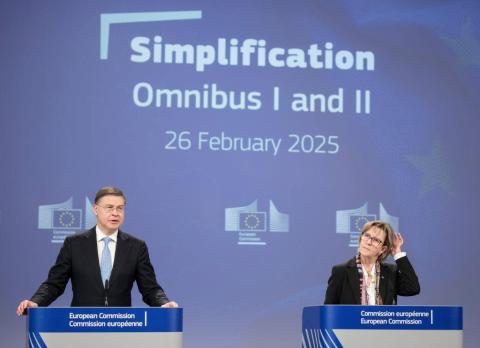European Economic
and Social Committee
Omnibus proposal: simplification while upholding high EU Standards
The Omnibus proposal could mark an important first step towards regulatory simplification. We welcome the Commission’s initiative as a concrete move forward, which should be followed by further actions in the same direction. However, it is crucial that this process upheld the high environmental, social, and human rights standards.
In a requested opinion, the EESC calls for continued progress on the Omnibus initiative with the aim of delivering a regulatory framework that is clear, coherent, and ensures legal certainty. At the same time, it is essential that co-legislators dedicate sufficient time to consult all stakeholders affected by the proposal, as their input can provide valuable perspectives and contribute meaningfully to a democratic and inclusive decision-making process.
The Omnibus proposal, published by the European Commission on 26 February 2025 with the objective of cutting red tape and streamlining certain sustainability reporting requirements, includes a targeted revision of the Corporate Sustainability Reporting Directive (CSRD) and the Corporate Sustainability Due Diligence Directive (CS3D), as well as selected amendments to delegated acts under the EU Taxonomy Regulation. In addition, as part of the first Omnibus package, the Commission has also put forward a proposal for a regulation aimed at simplifying specific provisions of the Carbon Border Adjustment Mechanism (CBAM) Regulation, further contributing to regulatory coherence.
In this regard, the opinion underlines:
Corporate Sustainability Reporting Directive (CSRD)
In light of the current challenges faced by businesses—above all SMEs—under the Corporate Sustainability Reporting Directive (CSRD), the EESC calls for a more proportionate and supportive regulatory approach. While the CSRD is a key instrument in advancing the green transition by enhancing transparency and accountability, its implementation must remain practical and achievable. SMEs, in particular, often lack the necessary resources and capacity to navigate complex reporting requirements, which may limit their ability to innovate, grow, and actively contribute to sustainability objectives. It is therefore crucial to offer tailored support, minimise unnecessary administrative burdens, and safeguard SMEs’ ability to compete and thrive, while upholding Europe’s social and environmental values.
Corporate Sustainability Due Diligence Directive (CS3D)
In our contribution to the ongoing legislative process on the Corporate Sustainability Due Diligence Directive (CS3D), we call for a framework that is clear, proportionate, and anchored in legal certainty
With businesses spanning multiple countries, industries, and regulatory environments, it is essential that the framework is not only robust but also adaptable to the diverse challenges companies face. A particularly concerning aspect of the proposal is the use of the term “plausible information” as a trigger for assessing indirect business partners. This provision introduces a degree of legal uncertainty that could potentially burden companies, particularly when the scope of indirect relationships is vast and sometimes difficult to track. A clearer, more defined approach would allow businesses to focus their efforts on areas where they can have the greatest impact while avoiding unnecessary complexity.
We also express our concern over the deletion of the provision that would have allowed victims of corporate malpractice to be represented by NGOs or trade unions in court proceedings. This change risks limiting access to justice for those affected by corporate misconduct.
At the same time, the importance of harmonization cannot be overstated. As the CS3D progresses, it is imperative that definitions and implementation guidelines are standardized across EU Member States. A harmonized approach will reduce fragmentation within the Single Market, lower compliance costs for businesses, and ultimately strengthen the effectiveness of the directive. The goal should be to create a level playing field in which all businesses can operate under clear, consistent rules, helping to achieve both corporate accountability and the EU’s broader sustainability objectives.
Carbon Border Adjustment Mechanism (CBAM) Regulation
To be effective, the CBAM must ensure fairness and avoid unintended market distortions, particularly for EU producers.
The current proposal exempts small importers—those bringing in goods weighing less than 50 tonnes—from CBAM charges. While this reduces the burden on smaller operators, it risks giving imported goods a competitive advantage over EU-produced equivalents, which remain subject to EU carbon costs. To address this, we propose that the exemption for small importers be paired with compensatory measures for EU producers, such as maintaining full ETS allowances for EU-made goods or adjusting the threshold to prevent market distortions.
A balanced approach that includes compensatory measures for EU producers, regular updates to carbon price values, and stronger customs oversight represents an important first step toward ensuring that the Carbon Border Adjustment Mechanism (CBAM) supports the EU’s climate objectives without compromising the competitiveness of European industry or causing unintended carbon leakage through export displacement. Nonetheless, additional efforts will be required to prevent potential market distortions. If the mechanism proves insufficient or leads to significant imbalances, maintaining free allowances under the EU Emissions Trading System (ETS) could remain an essential safeguard. We will closely monitor the upcoming legislative proposal, expected by the end of the year, which will be key in shaping the CBAM’s future direction and effectiveness.
In conclusion, the EESC’s Opinion aims to ensure that the Omnibus proposal strikes the right balance between regulatory simplification and the preservation of high environmental, social, and human rights standards. We call for a clear, practical, and proportionate framework in key areas such as the Corporate Sustainability Reporting Directive, the Corporate Sustainability Due Diligence Directive, and the Carbon Border Adjustment Mechanism.

Matteo Borsani, EESC Employers' Group member and Rapporteur of Opinion INT/1086 First Omnibus package on sustainability.
